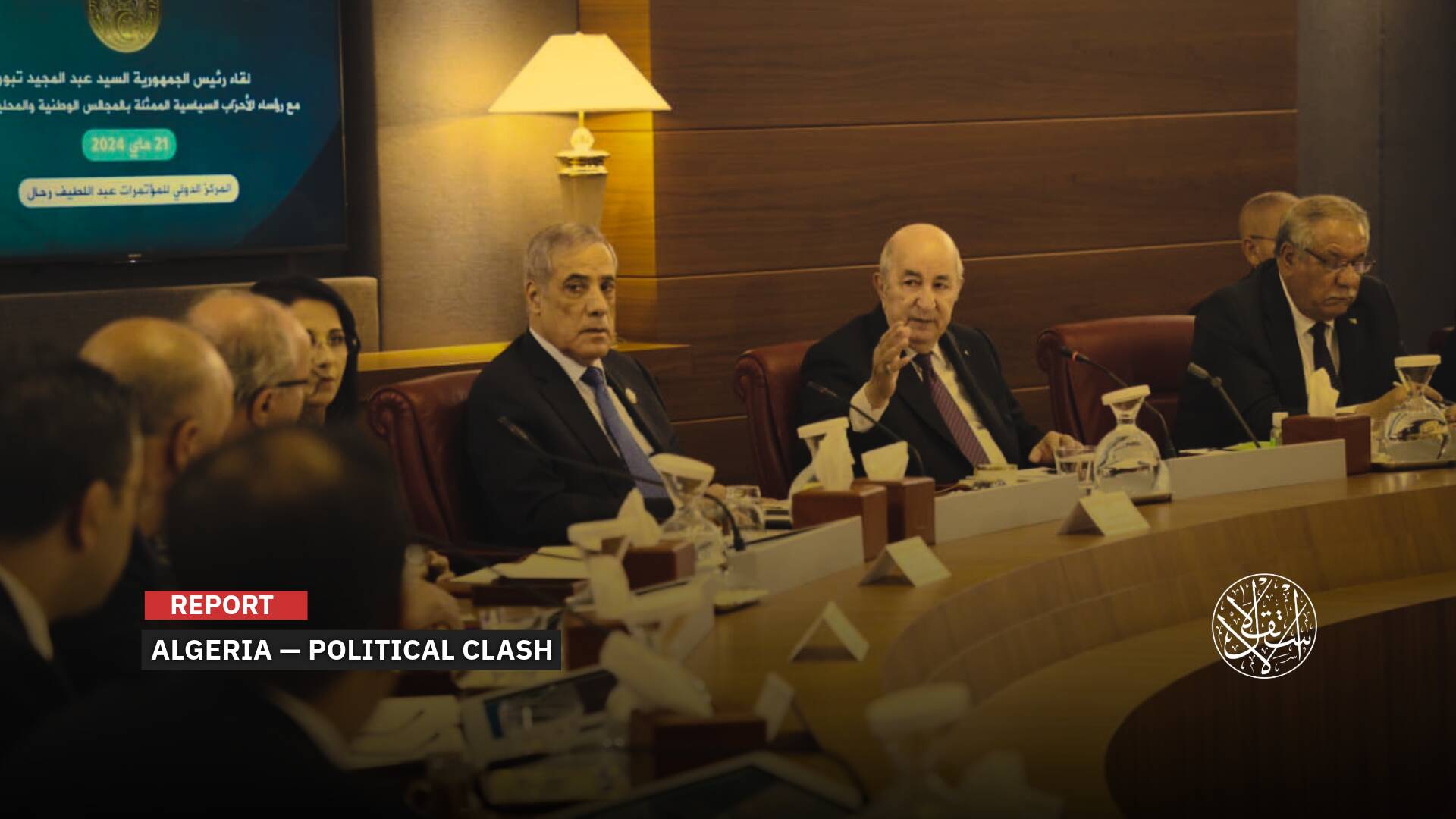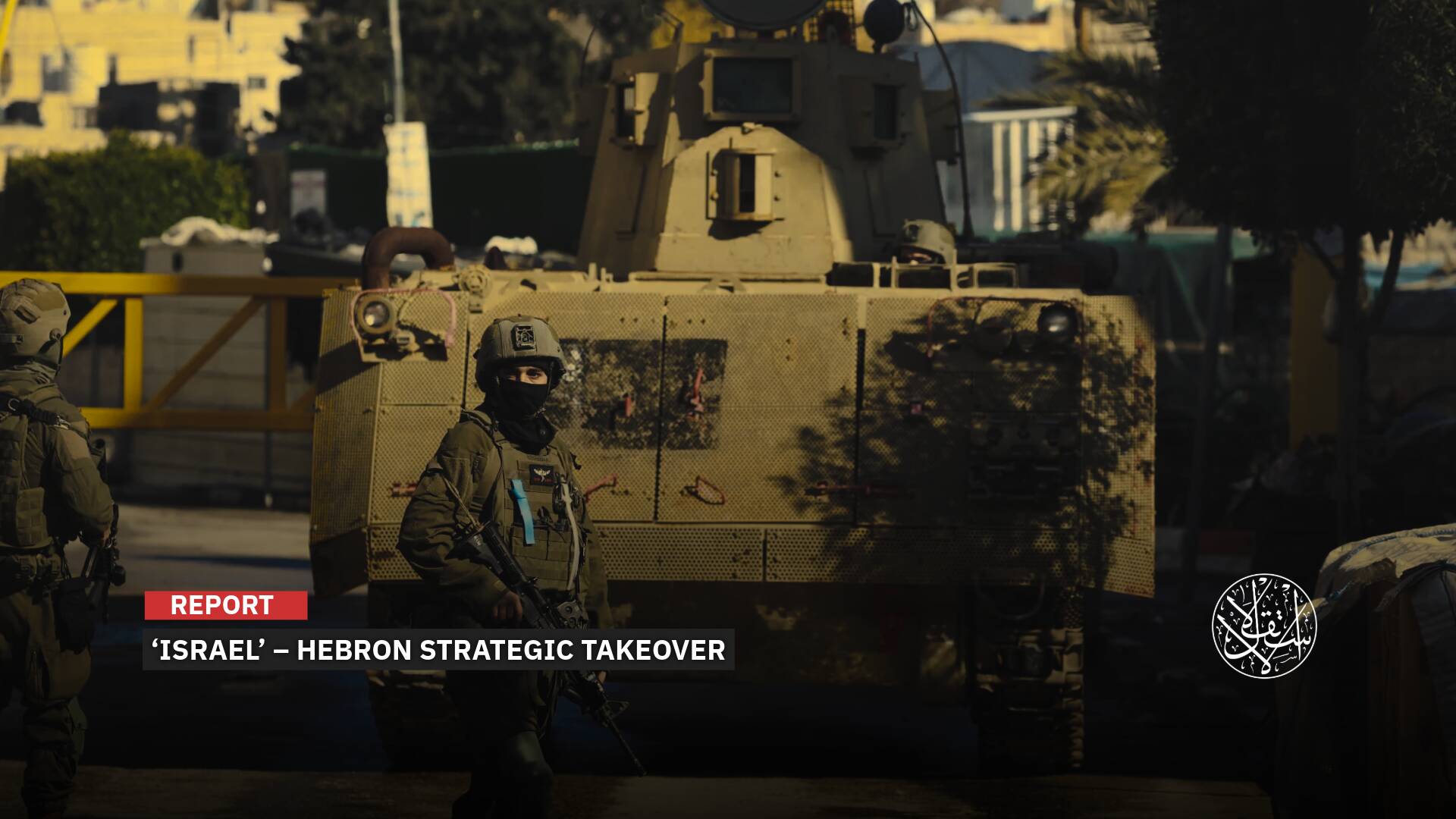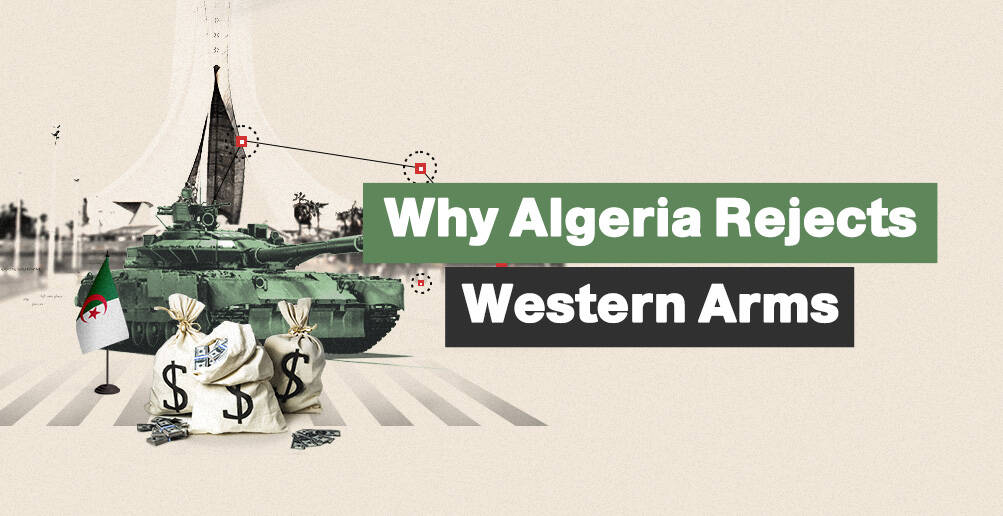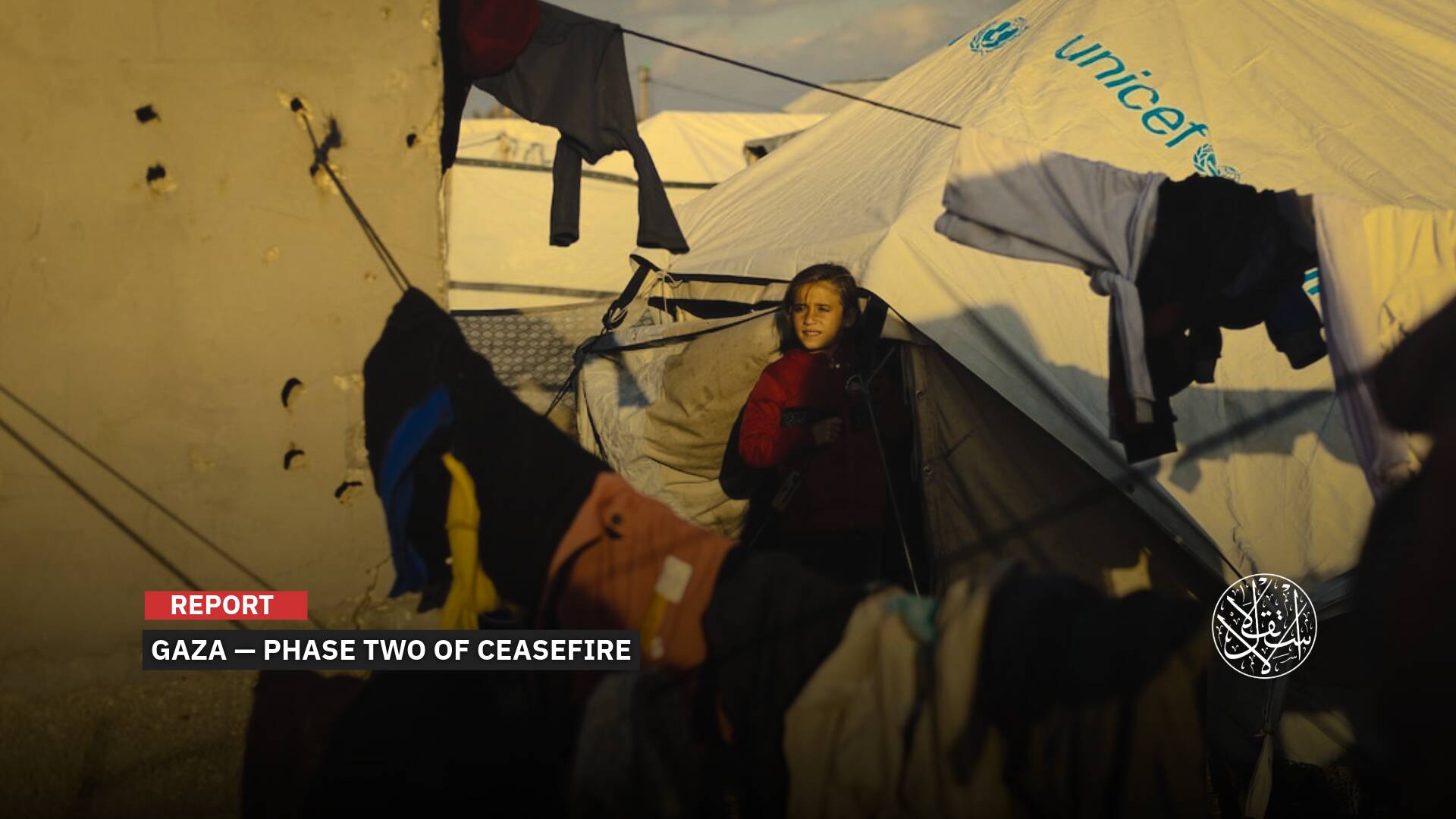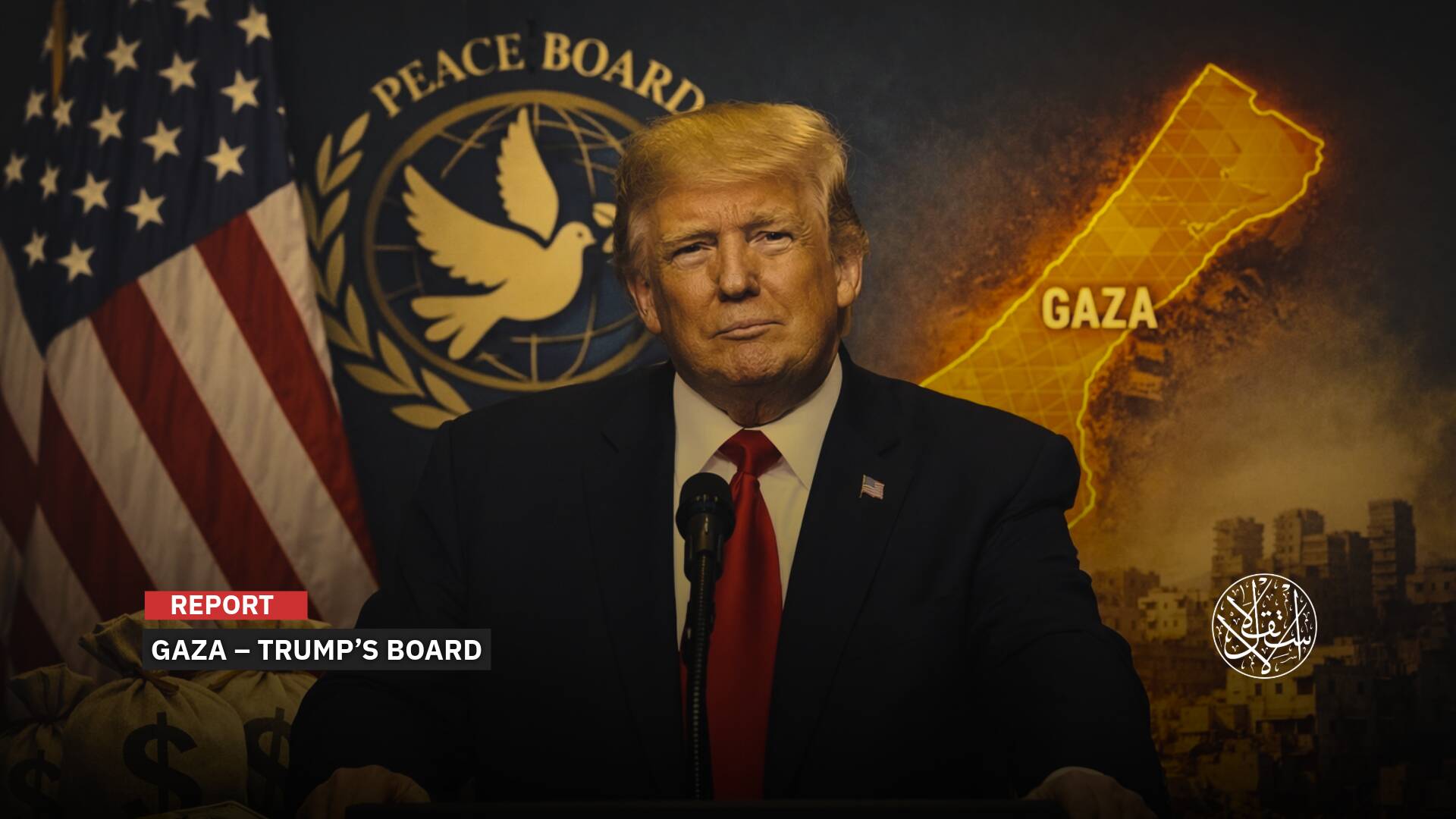Activist Warns: Saied Faces Stronger Resistance as Era of One–Man Rule Ends
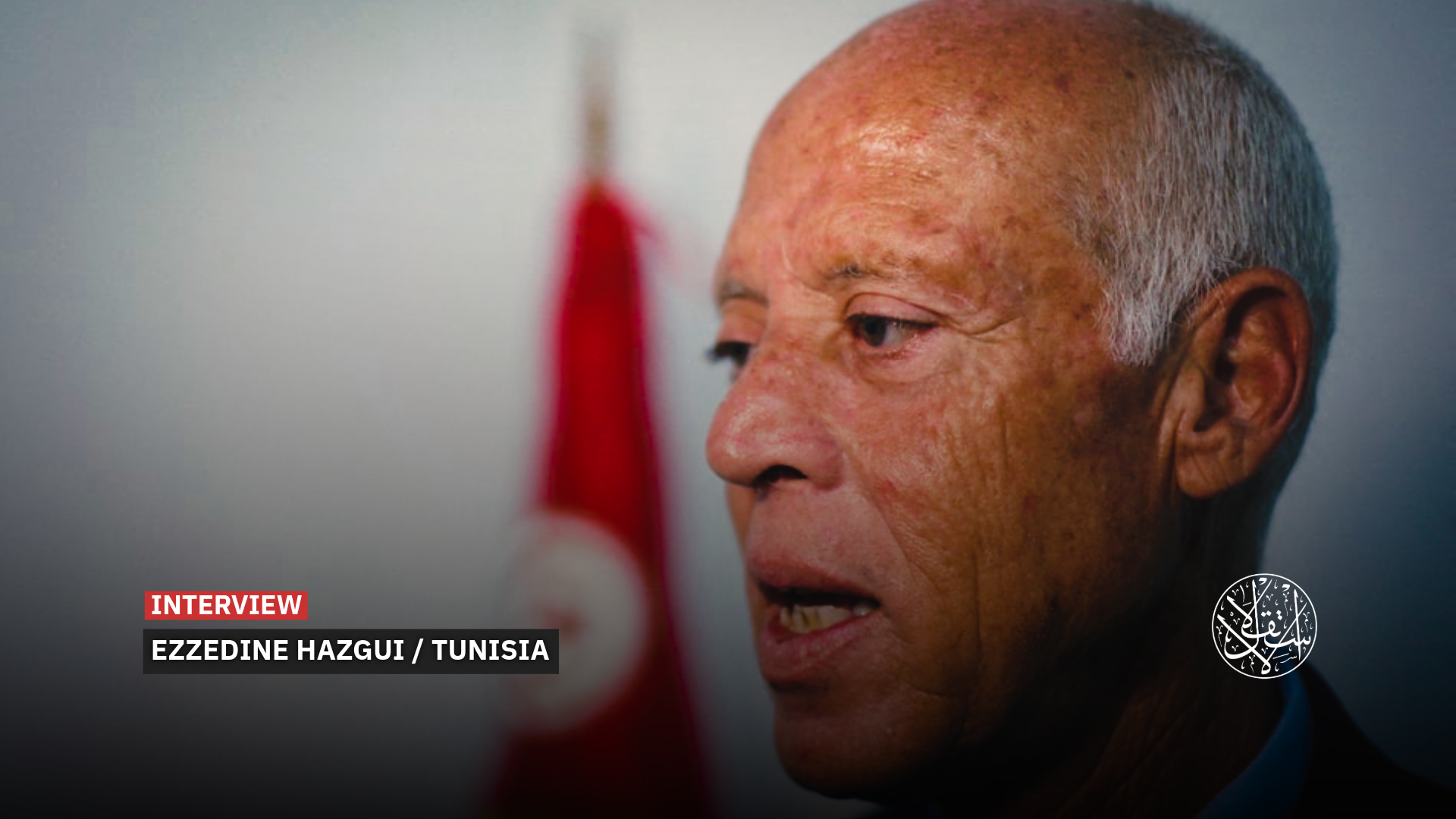
“Today, there is no genuine intellectual or prominent national figure standing with Saied.”
Tunisian leftist activist Ezzedine Hazgui said the country’s hopes now rest with its youth to confront President Kais Saied’s growing authoritarianism and revive the spirit of the revolution, expressing confidence in their ability to reclaim Tunisia’s democratic path.
In an interview with Al-Estiklal, Hazgui said Tunisia’s young generation embodies the spirit of collective action that President Kais Saied seeks to suppress, as do all autocrats who see themselves as singular leaders, insisting that the age of one-man rule is over. He added that Saied’s governing mindset harks back to the Middle Ages, reflected most starkly in the country’s prison conditions.
The veteran Tunisian activist also said that intelligence agencies from several foreign powers had meddled in Tunisia’s affairs, helping to create the country’s current turmoil, with President Saied emerging as the main beneficiary. He added that the recent bombing of the Global Sumud Flotilla off the Tunisian coast, which was bound for Gaza to break the siege, was carried out by collaborators with the Israeli Occupation operating from inside Tunisia.
Ezzedine Hazgui, 79, is one of the most prominent figures of the Tunisian left since the 1970s, gaining recognition through the Perspective movement. He was imprisoned for a long period between November 14, 1973, and May 1979 due to his political activism, a period he documented in his book “Nadharatou Ommi” (My Mom’s Glasses).
He also once ran for president against former ruler Zine el-Abidine Ben Ali and founded the “Doustourna” network for rights and freedoms. Hazgui opposed post-revolution governments under various leaders and affiliations and is a strong critic of the July 25, 2021, coup carried out by Kais Saied.
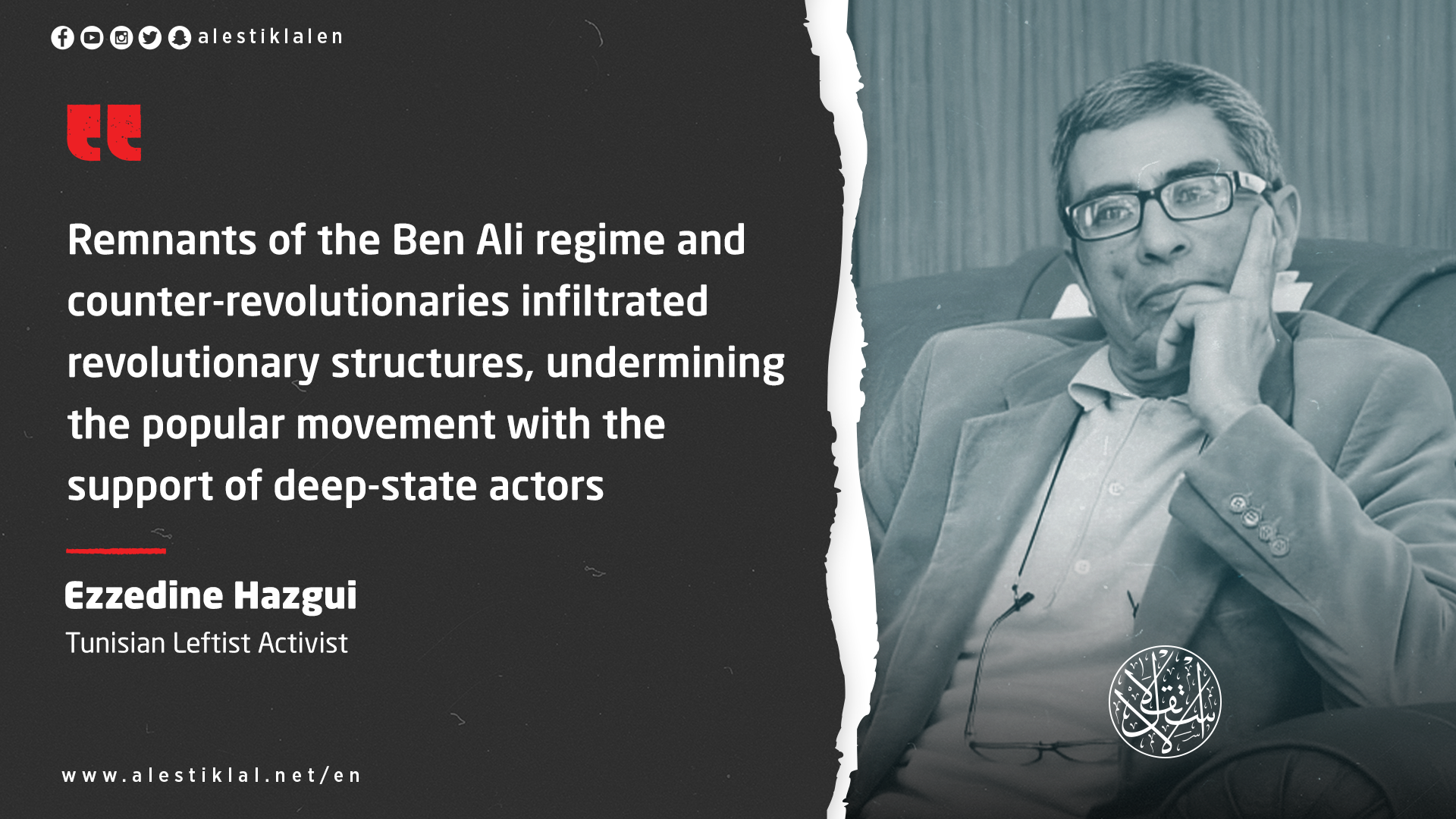
Saied’s Authoritarianism
By August 2025, mysterious deaths in Tunisian prisons were on the rise. Do you think Kais Saied has become completely indifferent to such tragedies?
Basically, Saied shows no concern for human life. Ordinary citizens are the least of his worries, absent from his calculations entirely. His sole objective is to cling to power, even if it comes at the expense of destroying the Tunisian people and others along the way.
Saied monopolized the coronavirus vaccine and only released it two days after the 2021 coup, which froze parliament, dismissed the government, and gave him full executive power. During that period, 20,000 Tunisians died. Can we expect him to be concerned about the lives of prisoners or others? A dictator has neither heart nor reason.
The dictator who rules Tunisia sees himself as a divinely chosen savior, a prophet sent to rescue humanity. To him, every death is merely destiny, a convenient belief that absolves him of any responsibility for these crimes.
In Tunisia, our prison system feels stuck in the Middle Ages, run by officials steeped in outdated, medieval laws and mindsets. The country’s prison capacity is 17,000, yet today there are 33,000 inmates.
This naturally results in shortages across all prison facilities—beds, toilets, services, food, water, and basic prisoner rights. Sick inmates die, and healthy ones fall ill. The message from Saied to prisoners is clear: die or go to hell. Prison officials, seeing a head of state indifferent to life, may take actions that lead to death rather than prevent it.
Judges under Saied fail to uphold the general principle of law that freedom is the default. The judiciary and Ministry of Justice do not care about human life. Anyone arrested is imprisoned first, with their case considered afterward, a disgrace experienced by Tunisians.
Saied and his allies operate with a medieval mindset in every sense.
In August 2025, the last political program on Tunisian radio was shut down because it discussed the economy and political reality. What is your comment?
Saied closes any space that allows the people’s voice to be heard—media, culture, civil and community work. This is typical of all authoritarians, who believe they possess the absolute truth. We have never seen laws written in offices and executed immediately; this is not a state.
What messages would you send to those who supported Saied and still do?
I remind them of those who supported former President Habib Bourguiba, those who backed Ben Ali, and all tyrants. Today, there is no genuine intellectual or prominent national figure standing with Saied. They have all abandoned him, leaving him only with half-intellectuals, opportunists, and beneficiaries. Anyone who supports him is placing themselves in the dustbin of history.
Those who supported Ben Ali vanished the moment he fled. Saied now lives alone in Carthage Palace, surrounded by a very small group, exploiting their need and willingness to benefit personally. To them I say: this is the place that suits you.
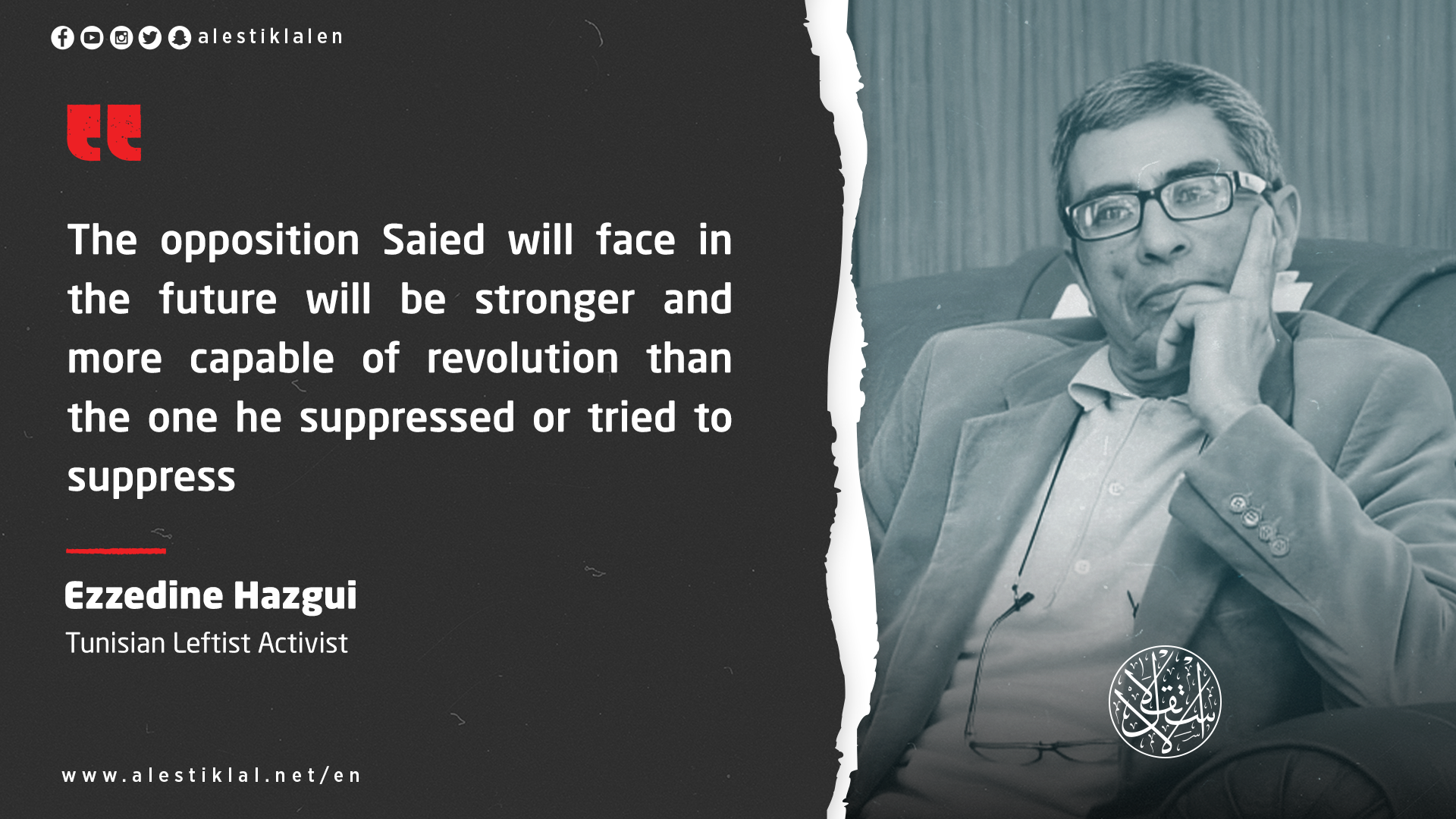
Absence of Democracy and Justice
Lately, reports have surfaced about a U.S. initiative to “restore democracy” in Tunisia. How do you see these claims?
Fundamentally, the United States and the West have a well-known history of colonialism and exploitation. None of these powers will offer gifts or positive actions without expecting something in return, especially the United States, with its horrific history of killing entire populations and orchestrating dozens of coups in underdeveloped societies. Their history is full of violence and anti-democratic behavior. These are basic facts with no dispute.
So, should we expect them to cooperate to achieve our freedom, overturn this brutal coup, and restore democracy in our country? If they do, they are welcome, but I doubt they would push Kais Saied toward that. History shows that they act in their own interests, even if achieved through tyranny and oppression of peoples.
The truth is, we do not need American intervention or anyone else. What we need is a state, and a true state is one of real institutions, not controlled by a single individual. This is the opposite of what Saied is doing.
Can we also discuss the case of your son, constitutional expert Jawhar ben Mubarak Hazgui?
Jawhar is an independent activist working in civil society. He was arrested in February 2025, accused of conspiring against state security, attempting to kill Saied, and facing around 17 false charges along with a group of others.
The investigating judge listed 17 charges without allowing him to speak or be heard and referred him to detention during an interview that lasted less than four minutes.
Since then, he has remained behind bars, sentenced along with more than forty others to 18 years in prison without ever appearing before a judge. His health has sharply declined, and he now suffers from several serious illnesses.
Jawhar ben Mubarak lost his job, his salary, and his life, and he cannot see or communicate with his son during visits due to illness.
This situation extends to hundreds of other detainees, all because Kais Saied fabricated charges against them.
Tyranny Against the Opposition
How did Kais Saied manage to impose his authoritarian rule on Tunisia despite the revolutionary momentum before his rise?
This dictator capitalized on the challenges that revolutionaries and thinkers faced once power was in their hands.
They needed time to build, but he denied them that chance. Ten years is a fleeting moment in a nation’s life, yet Saied and his circle cut the journey short, halting the people’s revolution in its tracks.
Regardless of disagreements among revolutionaries and reformers, they needed time to establish a clear and strong state framework.
Another important factor was the inexperience of those who assumed responsibility at the time. They had never handled responsibilities of this magnitude before.
As a result, many gaps remained, allowing remnants of the Ben Ali regime and counter-revolutionaries to infiltrate revolutionary structures, undermining the popular movement. This was aided by other deep-state countries opposed to revolutions and the Arab Spring, such as the UAE, Saudi Arabia, and Egypt.
These countries supported Tunisians to sow doubt about the revolution and democratic path, convincing the people that returning to a state of injustice and oppression was best for Tunisia. Under false pretenses, they largely succeeded.
Thus, a major imbalance allowed anti-revolutionary forces to dominate the scene.
The Tunisian people found themselves between a rock and a hard place, between populist Saied and the mafia and deep state. Unfortunately, they chose the former, even though both options were extremely bitter.
This was a trap set by the Saudis, Emiratis, and even Algerians, along with Tunisian mafias, especially opponents of the Egyptian Arab Spring who overthrew the revolution in their own countries and feared any revolutionary approach in the Arab world or globally.
Do you think Saied’s measures against the opposition have succeeded?
The opposition Saied will face in the future will be stronger and more capable of revolution than the one he suppressed or tried to suppress.
The ten years of freedom we experienced, coupled with conspiracies against the revolution, the coup, the emergence of youth movements whose features are still developing, the presence of activists in prisons, and the appearance of new forms of struggle—all this contributes to forging a new type of opposition.
This opposition will be youth-driven, with vision and action that Saied and his allies cannot tolerate.
Therefore, even if he thinks he has crushed the opposition, the emergence of a new, stronger resistance will ultimately turn against him and those who back him.
I am confident—and this is not wishful thinking—that about 90 percent of the Tunisian people now hold a position hostile to the coup, to Saied, and to those allied with him.
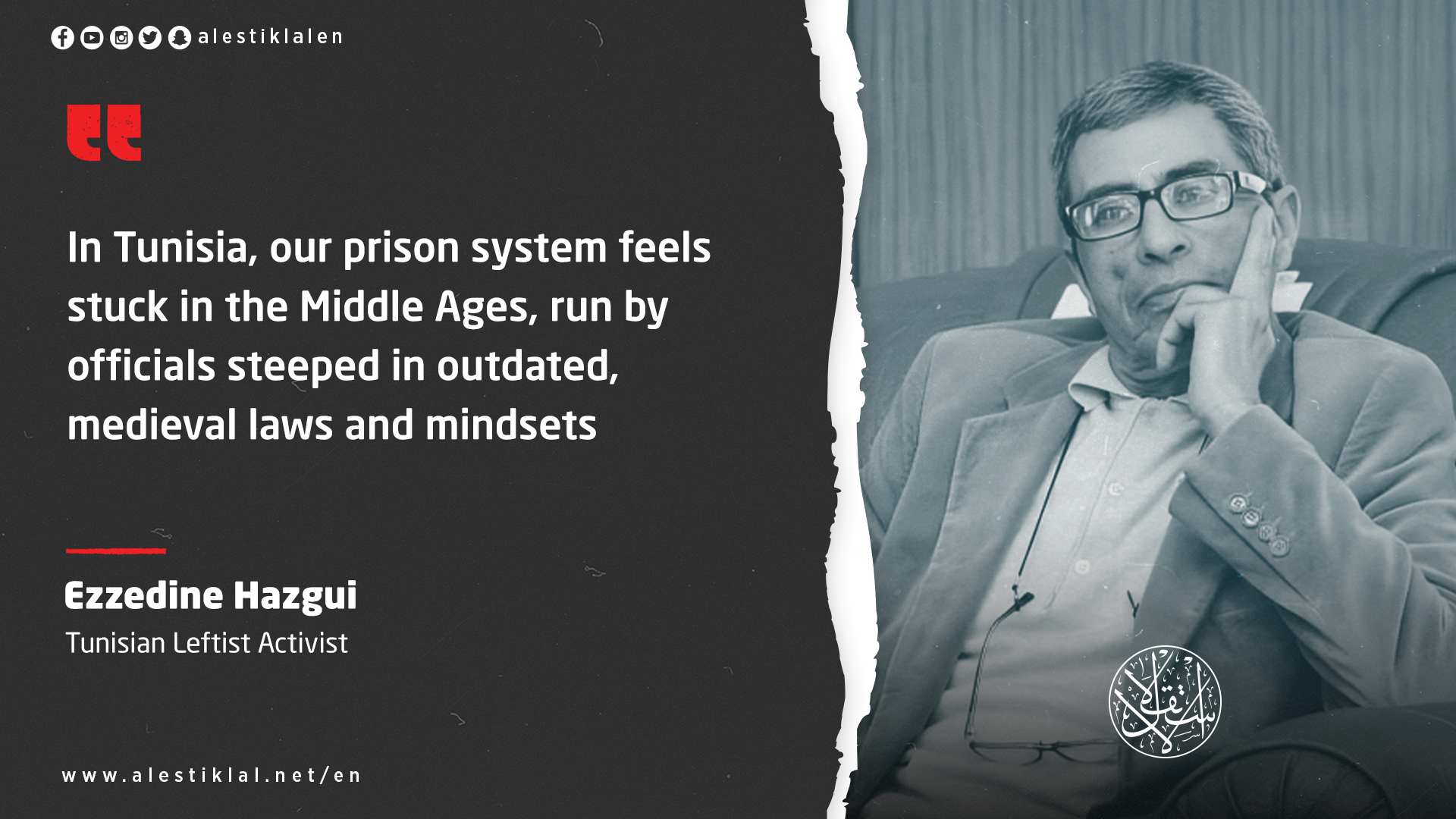
The Future of the Revolution
How has Tunisia’s deepening polarization drained the revolution and shaped today’s crisis?
Polarization is primarily fueled by external intelligence agencies supporting Kais Saied. It is in their interest for this division to persist so that people remain preoccupied with their differences, allowing the current situation to continue.
This is a common tactic of coup plotters. Some countries’ intelligence agencies tirelessly support Saied because they fear and resist change in any state, and polarization is one of their main tools.
It has been five years since Saied’s coup ended democracy. Can the revolution regain its strength and rid Tunisia of tyranny?
This depends on the determination and will of the Tunisian people; the solution lies in their hands. However, the reality now is that the leaders who could mobilize the streets have been imprisoned by Saied because he fears them and their influence over the population.
He knows the competence of these leaders across all political currents and fabricated false, even laughable, charges to imprison them unjustly.
We once had a labor union aligned with the people and the revolution, but now its members are complicit, siding with Kais Saied in one way or another.
Thus, they cannot be relied upon to mobilize the streets. The hope now rests with roughly 1.8 million young people who were between ten and twelve years old at the time of the revolution. Today, they are the hope of the revolution.
Young men and women in their twenties are, in my view, Tunisia’s real hope, because they grew up in an environment of absolute freedom.
Tunisia experienced ten years of freedom, including multiple parties, elections, real parliaments, intellectual debates, and discussions on social media—a true atmosphere of liberty.
This generation has lived in these free conditions, making it extremely difficult for any tyrant to suppress or permanently oppress them. They are, in my opinion, the hope of Tunisia, and the decision is in their hands.
I expect that they will save Tunisia, wrest it from the hands of this unjust dictator, and establish real democratic institutions and a true state.
The advantage of this generation is that they are building a culture of collective action, which opposes the idea of a single ruler. Young people today, who use social media, understand that by working together, they will be a formidable force against Saied and any tyrant. This is why autocrats always fear collective action.
The idea of one-man rule, as practiced by Kais Saied, is a natural enemy of collective action and knowledge.
The message Saied must now understand is that the era of one-man rule has ended. Anyone claiming to be the sole leader capable of doing everything is a liar and bankrupt. I have hope that the youth will save the country.
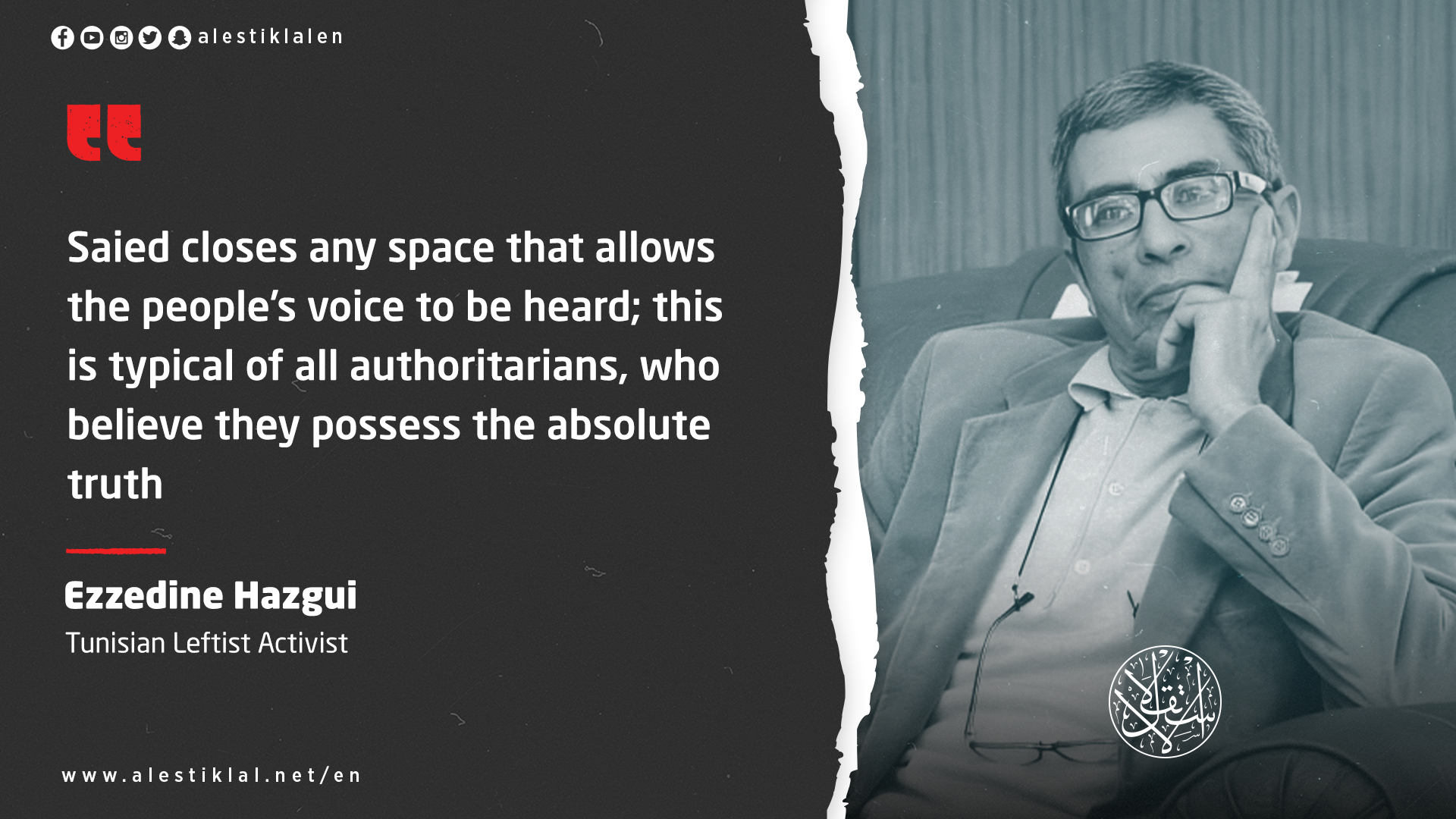
Other Issues
Recent statistics indicated that the Tunisian economy grew by 3.2 percent compared to the first quarter of this year. Do you expect improvement in the coming period?
I see this as fake growth, and reality supports that view. The figures published by the state are false and misleading, intended to lull the people, while the actual situation speaks for itself.
Anyone who lacks a clear plan, a clear vision for economic reform, and a national development program—and I emphasize the word “national”—is bound to fail.
How could Saied possibly succeed while mired in such decay and pathetically weak performance? He is destined to remain a mere follower.
Saied has taken out 33 loans in recent years from banks charging Tunisia exorbitant interest, borrowing only to repay previous debts. With this approach, where is development supposed to come from? This is why so many young people are risking their lives at sea to emigrate.
Anger among youth is increasing because the foundations for development are entirely missing. This failure comes despite Saied controlling all state resources alone, showing clearly that he is unfit to lead Tunisia.
The man is incapable even of solving very simple problems. I say this is a trap we have fallen into, and the people must reclaim their freedom themselves.
After the October 2024 elections, you spoke about a national program to rescue Tunisia on multiple levels. Do you have any details on this program?
Yes, we proposed a pragmatic program, not based on dreams and illusions as Saied does. We emphasized realism, reassessing our capacities, and mobilizing our energies across all sectors.
The program included studies on Tunisia’s resources and ways to support them economically by conducting a full review of our failed development.
It called for opening markets, ending state monopolies on imports and exports, stopping exploitation of so-called public lands, and eliminating bureaucratic drains on the country.
Politically, it proposed a new framework to restore balance and real separation of powers, preventing any return of dictatorship.
In the media, it proposed establishing a free and responsible press once democracy is restored. In education, it outlined a radical reform of the education system with clear plans.
Other areas were addressed in the program as well, but so far no one has paid attention because power remains in the hands of the dictatorship.
We hope that Tunisia will benefit from this program one day. The key takeaway is that any development initiative must be scientific, realistic, and national, freeing us from a dependent economy that allows others to determine our destiny.
Regarding the Israeli Occupation attack on the Global Sumud Flotilla off the Tunisian coast, what do you say?
I do not believe Israel directly struck the fleet. Tunisia is currently infiltrated by various intelligence agencies—Egyptian, French, Emirati, Israeli, and others.
The real concern is the state’s and agencies’ inability to detect these operatives. How can a foreign power freely act inside our country?
Those who attacked the fleet are collaborators with Israel and Mossad. When Tunisia becomes a real, functioning state, we will be able to prevent and expose them.




